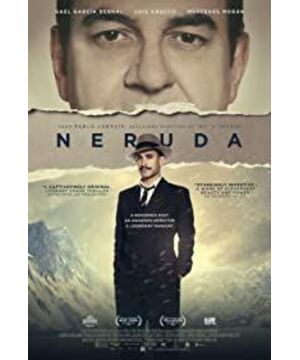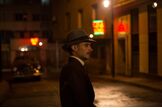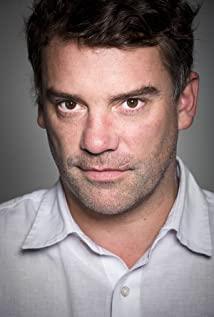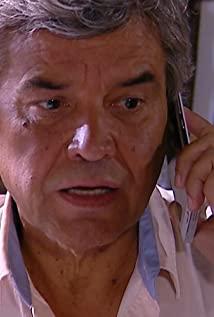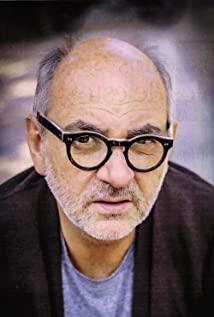"I like that you are silent
as if you disappeared
you listen to me from afar
My voice can't touch you
…”
I believe that most people first came into contact with Neruda because of the above poem translated by Li Zongrong. This poem is the fifteenth from Neruda's collection of poems, Twenty Love Poems and a Song of Despair . There is a song in China called "Break Up In That Autumn". It was very popular in high school. There is a narration at the beginning of the song, which is a part of the poem I read. It seems that in a certain movie, Liu Yifei also read it.
I came into contact with this poem when I was in junior high school. At that time, I copied it and Tagore's "The Farthest Distance in the World" together, with the front and back pages next to each other, in my most cherished notebook. Later, I entered the university and read a lot of poems, such as Gu Cheng, Hai Zi, Lin Saining, Tagore, Keats, etc., but I don't remember seeing Neruda again. I can just use this movie to make up for it. In this film, the 20th poem in the same collection of poems appears frequently.
"Tonight I can write the saddest verse thinking I don't own her
Feel like I've lost her to listen to the vast night
wider without her
…”
On the whole, it tells about a passage of Neruda's escape. Slightly dull, somewhat humorous, full of literary flavor, forget it if you are impatient. From the beginning of the film to anger the president, the president called the sheriff to pursue him, to the later Neruda fleeing, first moving to a hidden residence found by a friend, then escaping by boat to a remote town, and finally over the snow-capped mountains. , has been talking about escape. As the little brother who protected Neruda said, what he wanted was a grand escape...
The opening scene is an extremely chaotic place, pissing and drinking in one place, lawyers and criminals dancing together, perhaps to show that these so-called upper classes are very extravagant and filthy. Neruda was very popular, surrounded by people, the stars holding the moon, and everyone asked him to recite poems. On the other hand, the president hired a handsome sheriff to hunt down Neruda because he insulted himself in front of the media. Neruda kept running and running, and the sheriff kept chasing and chasing.
When I first saw Neruda, I felt incompetent to accept it. How could this fat, bald, fat man be a poet who can write so many romantic love poems? I refuse to accept it! The sheriff, the little brother who protected him, is more handsome than him! But after seeing the back, I unknowingly accepted this setting! The sheriff and the little brother are handsome, but that's what makes them ungrounded and unable to understand the suffering of the people at the bottom! Can't write a deep and deep love for the people.
When I saw Neruda reciting "Manga" among the crowd, I seemed to see Mr. Lu Xun. Both of them were writers. One wrote essays and the other wrote poems. Everyone's fighting spirit is to fight for the Communist Party, for democracy and equality! Two people in different countries, in different languages, doing the same thing, and they are far from each other. In the past, when I was in class, when I recited Lu Xun's introduction, the language teacher would always say that he was a proletarian soldier, but I didn't quite understand it at the time. What is a proletarian soldier, isn't it Neruda and Lu Xun? Fight for the rights of the working class and the bottom people for communism!
The president in the film said it very well, Neruda just took a piece of paper out of his pocket and 10,000 workers would be quiet. That's because they have to listen to his verses, because that line of poetry condenses the suffering in their own hearts! At the beginning of the hunt, Neruda was reluctant to run away, yeah, why run away, the proletariat is aboveboard, why go to hide under the bed? However, in order to convey his thoughts to more proletarians, he still chose to run away.
When the sheriff found Neruda's house, he was fascinated by their beautiful house, yes, such a beautiful house, how many people fantasize about owning it. The sun is soft, the bookshelves are full, the dog is sitting peacefully, you are painting on the drawing board, I am writing poetry by the window, everything looks so good. The sheriff chased after him again and again, and every time he ran into the air, Neruda would leave him a novel with a few sentences on it.
In fact, I also think that it is impossible for three hundred soldiers to find Neruda, and it was ordered by the president to find them, so how could they not be found? I'd rather believe what the waitress at the restaurant said, it's important to hunt him down, not catch him. What's important is the process of the hunt, the hunt, to let people all over the world know that Neruda is fighting for the proletariat.
In the film, Neruda is often like a child, lying on his wife's arms, asking her to wipe his body for him, wearing clothes and sucking his stomach mischievously. In fact, it is true, most poets are like children, such as Hai Zi, such as my favorite Gu Cheng. Because of his childlike sincerity, he can write such sincere poems. In the film, the sheriff finds Neruda’s ex-wife and asks her to attack Neruda on the radio, but the ex-wife keeps saying good things about Neruda, which also shows that Neruda is indeed a person that people cannot hate. Even separated, but also always read his good.
In the second half, the sheriff found Neruda's current wife, who told him that he was fictionalized by Neruda and told him to hunt down Neruda. Indeed, he has been chasing, has been unable to catch up, until the end. There is a saying that the sheriff is not scary, just afraid that the sheriff is literate. The sheriff himself said that he is also a possible artist! So his pursuit of Neruda is more like the pursuit of literature and art. And most of the narration in the whole film is also spoken in the tone of the sheriff, and the relationship between the two of them chasing and being hunted is also very interesting. As for what my wife said, I can't find any more clues about the novels written by Neruda for the time being. The only novels I found were The Postman and The Residents and Hope, and none of them seemed to tell the story of the hunt.
In the end, the sheriff died on the snowy mountain, which made people very helpless. In the end, the sheriff woke up again. From the beginning, the sheriff believed that he was the son of the founder of the most noble police agency, and later admitted that he might be the son of a prostitute or a worker at the bottom, and a symbol of the transition from the bourgeoisie to communism. In addition, from the " Twenty Love Poems and a Song of Despair " that he recited at the beginning, to the "Manga" he recited later, Neruda is actually changing, from love to democracy, from the small self to the big self.
In fact, I was wondering if, as the little brother who protected Neruda said, what Neruda wanted was such a grand escape, so that his proletarian ideas could be conveyed farther.
The film has a lot of narration, which looks a bit messy, the plot is very weak, and it feels a bit stream-of-consciousness, like a piece of prose. However, the coloring of the whole film is very hazy, dreamlike and poetic, very similar to the tone of the film. The whole film uses a comical way to show the turmoil of Neruda's running for the proletariat after World War II.
Welcome to pure original graphic: fish pattern
View more about Neruda reviews


